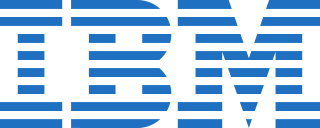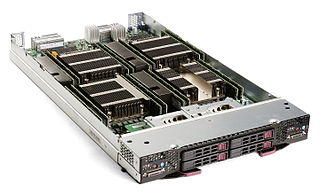Related Research Articles

Compaq Computer Corporation was an American information technology company founded in 1982 that developed, sold, and supported computers and related products and services. Compaq produced some of the first IBM PC compatible computers, being the second company after Columbia Data Products to legally reverse engineer the BIOS of the IBM Personal Computer. It rose to become the largest supplier of PC systems during the 1990s before being overtaken by Dell in 2001. Struggling to keep up in the price wars against Dell, as well as with a risky acquisition of DEC, Compaq was acquired for US$25 billion by HP in 2002. The Compaq brand remained in use by HP for lower-end systems until 2013 when it was discontinued. Since 2013, the brand is currently licensed to third parties for use on electronics in Brazil and India.

Itanium is a discontinued family of 64-bit Intel microprocessors that implement the Intel Itanium architecture. The Itanium architecture originated at Hewlett-Packard (HP), and was later jointly developed by HP and Intel. Launched in June 2001, Intel initially marketed the processors for enterprise servers and high-performance computing systems. In the concept phase, engineers said "we could run circles around PowerPC...we could kill the x86." Early predictions were that IA-64 would expand to the lower-end servers, supplanting Xeon, and eventually penetrate into the personal computers, eventually to supplant reduced instruction set computing (RISC) and complex instruction set computing (CISC) architectures for all general-purpose applications.

A minicomputer, or colloquially mini, is a type of smaller general-purpose computer developed in the mid-1960s and sold at a much lower price than mainframe and mid-size computers from IBM and its direct competitors. In a 1970 survey, The New York Times suggested a consensus definition of a minicomputer as a machine costing less than US$25,000, with an input-output device such as a teleprinter and at least four thousand words of memory, that is capable of running programs in a higher level language, such as Fortran or BASIC.

Informix is a product family within IBM's Information Management division that is centered on several relational database management system (RDBMS) and multi-model database offerings. The Informix products were originally developed by Informix Corporation, whose Informix Software subsidiary was acquired by IBM in 2001.
IA-64 is the instruction set architecture (ISA) of the discontinued Itanium family of 64-bit Intel microprocessors. The basic ISA specification originated at Hewlett-Packard (HP), and was subsequently implemented by Intel in collaboration with HP. The first Itanium processor, codenamed Merced, was released in 2001.

Db2 is a family of data management products, including database servers, developed by IBM. It initially supported the relational model, but was extended to support object–relational features and non-relational structures like JSON and XML. The brand name was originally styled as DB2 until 2017, when it changed to its present form.
Tandem Computers, Inc. was the dominant manufacturer of fault-tolerant computer systems for ATM networks, banks, stock exchanges, telephone switching centers, 911 systems, and other similar commercial transaction processing applications requiring maximum uptime and no data loss. The company was founded by Jimmy Treybig in 1974 in Cupertino, California. It remained independent until 1997, when it became a server division within Compaq. It is now a server division within Hewlett Packard Enterprise, following Hewlett-Packard's acquisition of Compaq and the split of Hewlett-Packard into HP Inc. and Hewlett Packard Enterprise.
NonStop SQL is a commercial relational database management system that is designed for fault tolerance and scalability, currently offered by Hewlett Packard Enterprise. The latest version is SQL/MX 3.4.
NonStop is a series of server computers introduced to market in 1976 by Tandem Computers Inc., beginning with the NonStop product line. It was followed by the Tandem Integrity NonStop line of lock-step fault-tolerant computers, now defunct. The original NonStop product line is currently offered by Hewlett Packard Enterprise since Hewlett-Packard Company's split in 2015. Because NonStop systems are based on an integrated hardware/software stack, Tandem and later HPE also developed the NonStop OS operating system for them.

A blade server is a stripped-down server computer with a modular design optimized to minimize the use of physical space and energy. Blade servers have many components removed to save space, minimize power consumption and other considerations, while still having all the functional components to be considered a computer. Unlike a rack-mount server, a blade server fits inside a blade enclosure, which can hold multiple blade servers, providing services such as power, cooling, networking, various interconnects and management. Together, blades and the blade enclosure form a blade system, which may itself be rack-mounted. Different blade providers have differing principles regarding what to include in the blade itself, and in the blade system as a whole.
HPE Integrity Servers is a series of server computers produced by Hewlett Packard Enterprise since 2003, based on the Itanium processor. The Integrity brand name was inherited by HP from Tandem Computers via Compaq.
Enscribe is the native hierarchical database in the commercial HP NonStop (Tandem) servers. It is designed for fault tolerance and scalability and is currently offered by Hewlett Packard Enterprise.
SAP IQ is a column-based, petabyte scale, relational database software system used for business intelligence, data warehousing, and data marts. Produced by Sybase Inc., now an SAP company, its primary function is to analyze large amounts of data in a low-cost, highly available environment. SAP IQ is often credited with pioneering the commercialization of column-store technology.

ProLiant is a brand of server computers that was originally developed and marketed by Compaq, Hewlett-Packard (HP), and currently marketed by Hewlett Packard Enterprise (HPE). ProLiant servers were first introduced by Compaq in 1993, succeeding their SystemPro line of servers in the high-end space.
In computing, the term data warehouse appliance (DWA) was coined by Foster Hinshaw for a computer architecture for data warehouses (DW) specifically marketed for big data analysis and discovery that is simple to use and has a high performance for the workload. A DWA includes an integrated set of servers, storage, operating systems, and databases.

The HP MediaSmart Server is a line of home servers sold by Hewlett-Packard, designed to run Microsoft's Windows Home Server operating system.

The Hewlett-Packard Company, commonly shortened to Hewlett-Packard or HP, was an American multinational information technology company headquartered in Palo Alto, California. HP developed and provided a wide variety of hardware components, as well as software and related services to consumers, small and medium-sized businesses (SMBs), and fairly large companies, including customers in government, health, and education sectors. The company was founded in a one-car garage in Palo Alto by Bill Hewlett and David Packard in 1939, and initially produced a line of electronic test and measurement equipment. The HP Garage at 367 Addison Avenue is now designated an official California Historical Landmark, and is marked with a plaque calling it the "Birthplace of 'Silicon Valley'".

Vertica is an analytic database management software company. Vertica was founded in 2005 by the database researcher Michael Stonebraker with Andrew Palmer as the founding CEO. Ralph Breslauer and Christopher P. Lynch served as CEOs later on.
BASE24 is a series of applications produced by ACI Worldwide, Inc. that support payment systems used by large financial institutions.

HP Cloud was a set of cloud computing services available from Hewlett-Packard. It was the combination of the previous HP Converged Cloud business unit and HP Cloud Services, an OpenStack-based public cloud. It was marketed to enterprise organizations to combine public cloud services with internal IT resources to create hybrid clouds, or a mix of private and public cloud environments, from around 2011 to 2016.
References
- ↑ Morgan, Timothy Prickett (24 January 2011). "HP euthanizes Neoview data warehouse iron". The Register .